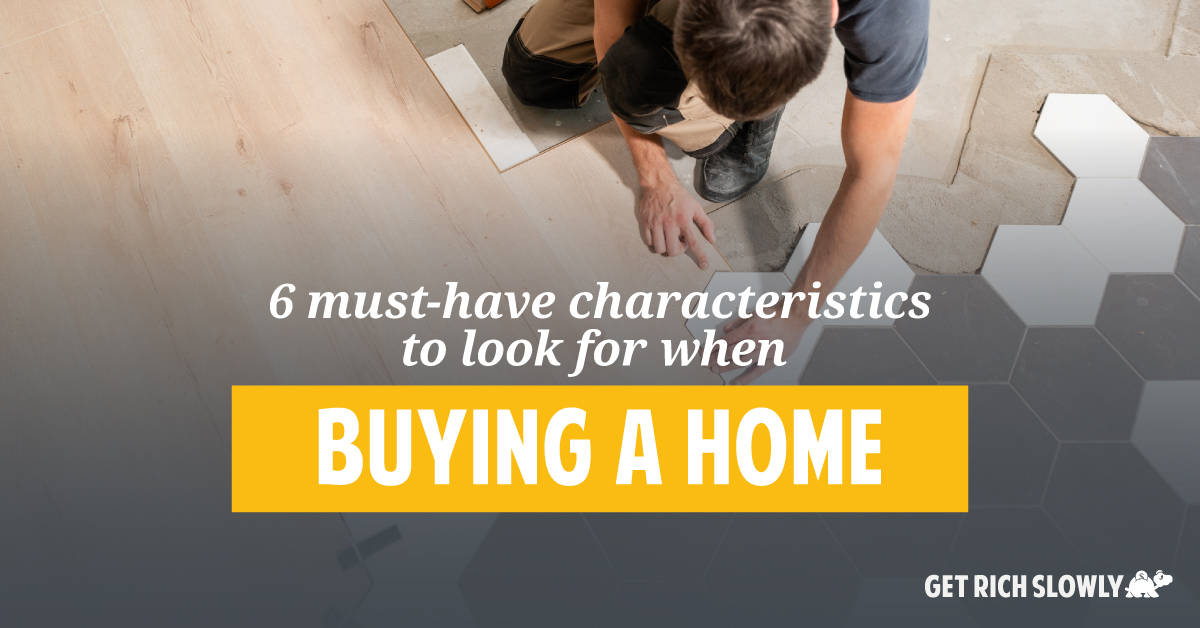6 must-have characteristics to look for when buying a home

With home prices down, foreclosures up, there's an influx of great homes on the market with less competition vying for them. The next year or so may present some prime buying opportunities for those willing to do some homework, and who meet the prerequisites of home ownership. Although it may seem counter-intuitive, one of the most important things to ask yourself when you start looking for a house is: “How easy will it be to sell this thing?”
Sound personal finance decisions usually involve thinking one step ahead. You should not be content just to get into a house that you emotionally fall in love with; rather, you should be looking to buy a house that you can get out of quickly, easily, and at a profit should life happen to throw you a curveball that will force you to move.
What characteristics lead to a house being highly “marketable”? Granted, there's not an exact set of criteria that will be ideal for all people in all situations and markets, but the more factors you have working in your favor the better. We're not talking about buying a house for the purpose of flipping it. We're simply talking about buying a house that you can live in, put some sweat equity into over time, and then sell for a profit.
Unexpected Moves Can Happen to Anyone
When I purchased my first home 3-1/2 years ago, I was thinking I would be in it until I was able to pay off my mortgage. I loved the location, the house, and the neighbors. My wife and I both had solid jobs. It was also a house that we could grow into: 3 bed, 1.5 bath, 1,500 finished square feet, full basement, and a nice yard — all in an area with a low cost-of-living and high quality-of-life.
Fast-forward 2-1/2 years: a fantastic job opportunity presented itself. We decided it would be best for us to sell and move two hours away. Thanks to some smart thinking before we bought the house and some elbow grease, we were not only able to sell the house in just three months, but make a 10% gain on it in a horrible market. Additionally, we were able to do this via “for sale by owner”.
As you shop for a home, keep in mind these characteristics that not only make it appealing to live in now, but will make it have greater equity in the future (thus making it easier to sell).
The Right Size
You need to not only look for a house that fits for you, but also that fits for the majority of the population. Here's what the majority of households are looking for or are able to adapt to:
- Look for a minimum of three bedrooms and a maximum of four. Two bedroom homes mostly cater to single people or couples that do not or will not have children (and aren't concerned with selling their house). At the same time, homes with five bedrooms or more cater to those who have a healthy number of children, or plan on having them in the near future. That makes three- and four-bedroom homes the perfect size for the majority of the population, with three bedrooms being ideal. If you haven't noticed, large suburban homes that are energy drainers are quickly going out of style.
- In terms of number of bathrooms, 1-1/2 or 2 will make the home more desirable than just one. If you're looking at a house that could cheaply add another half or full bath, you might have a good find.
- Square footage is important, but not quite as much as the number of bedrooms. Typically, you'll want more than 1,000 (with room to expand) and less than 2,000 for a home to be comfortable and efficient for the majority of the home-buying population.
Curb Appeal That is Ripe For Improvement
When it comes to selling a house, the biggest challenge is getting people in it. The key is to find an attractive home from an architectural perspective that needs aesthetic upgrades. Consider yourself lucky to find a home with an ugly paint color and really poor landscaping. These are two things that you can spruce up on the cheap with a little sweat equity.
If you're willing to get up on the roof, a home with a poor roof may present an opportunity to get a credit during the bidding process (with a recommendation from an inspector) that is worth the price of a professional doing the job. You can then turn around and buy the materials and do it yourself, while pocketing the remainder of the money to apply towards your loan or other projects. Our current home has an older roof with a few warped pieces of wood sheathing. We were able to get a $6,500 credit for a project that is costing just $2,000 to do on our own.
On the extreme end of things, our current house had an ugly asphalt driveway that was falling apart. What was attractive about this is that the driveway is only about 25 feet in length so tearing it out and replacing it only cost us $1,700. Now, it looks great!
Here are some other cheap ways to improve a home's curb appeal before you sell it:
- Paint the shutters
- Power wash everything
- Refinish the porch
- Add landscaping that looks great year-round
- Water the grass until it's the greenest on the block
- Add a nice new mailbox and address numbers
Good Structure
When it comes to buying a home, you want to avoid major structural issues that will cost you big money to fix or will diminish your leverage when it's time to sell if you haven't fixed them. Here are a few of the biggest culprits:
- Do not buy a house that has issues with the foundation. If you see large cracks in the foundation outside or on the basement walls, or the walls look like they are caving in some spots, kindly leave the house and look elsewhere.
- Termite or carpenter ant damage is common in some locales, and it may be hard to find an older home that hasn't had a little damage at one point or another. The key here is to find a home that does not have major structural damage and has no signs of current issues. Some home inspectors will actually insure for a year or more that there are no current signs of infestation, and if they appear, they will cover the costs to terminate.
- Have you ever walked through a house that makes you feel claustrophobic or just didn't feel right? Odds are that other people feel that way in the same homes. Don't buy them. This may be remedied by knocking down a wall or two in some homes, but that can be an expensive project and you may be risking structural damage.
- Avoid buying a house that has signs of mold or water damage. They can be very expensive to fix and usually are signs of larger foundational or roof issues. Here again, a good home inspector will be able to test or look for both.
- Beware problems with the electrical and plumbing systems. These are a home's lifeblood, and replacements are costly.
- If you buy a home with an ancient furnace, you may want to have it checked out beforehand. Any home with steam radiant heating may cost you a pretty penny to heat or replace.
Easy-to-Improve Internal Aesthetics
As with structure, making major changes to the interior of a home can be costly, but there are some cheap projects that can really change the perceived value and quality of a home. One summer's worth of weekends spent on the following projects can not only improve the marketability of your home, but make it much more enjoyable for you to live in. Look for a house that will allow you to do most of the following, as one with all of them done already will probably be selling for a premium:
- Add nice, modern-looking light fixtures
- Add fresh earth-tone paint
- Replace beat-up light switch covers
- Refinish hardwood floors
- Replace linoleum with tile
- Add a backsplash in the kitchen
Here are some of the features most people want, but won't be cost-effective for you to add:
- Central air conditioning
- Nice kitchen cabinets (or cabinets that will be nice when refinished)
- Fireplace
- Garage
- Energy-efficient windows
An Under-Priced Location
It seems that more people are looking to purchase in nice urban areas that are close to work versus suburban McMansions. Not only do these homes save commuting time and money, but they almost always have a lot more character and are much more structurally sound. In my most recent home-purchasing experience, I looked at a few houses built after 1999. All had large foundational cracks and cheap materials throughout.
Another bonus to purchasing a home in a more densely populated area is foot and car traffic. My first home was located just off the corner of a highly trafficked street. Because of this, I could put up a ‘for sale' sign pointing towards my house. I ran through 20+ flyers a day and ended up selling the house to someone who drove by it. You don't get this kind of exposure in the ‘burbs.
Highly desirable locales are going to cost you a premium, but you may be able to sell a home quicker. What I have searched for in my first two home purchases are areas that are relatively cheap compared to highly desired areas, yet have most or all of the same features. Others will realize the same thing when searching for a home.
Good School District
Even if you never plan on having children, it is important to look within areas that have a reputation for having good schools. Do it for the kids. If not yours, for the kids of the people buying your house from you.
The more desirable characteristics you're able to find or add to through inexpensive sweat equity will improve your chances of not only selling your home, but selling it quickly and for a premium.
What characteristics and specifications would make a house more appealing to you?
Become A Money Boss And Join 15,000 Others
Subscribe to the GRS Insider (FREE) and we’ll give you a copy of the Money Boss Manifesto (also FREE)


